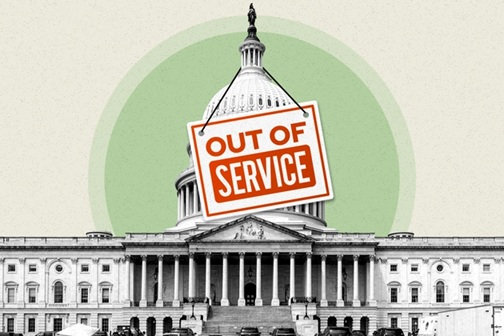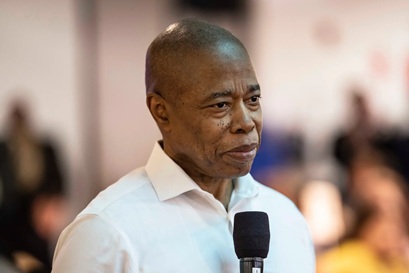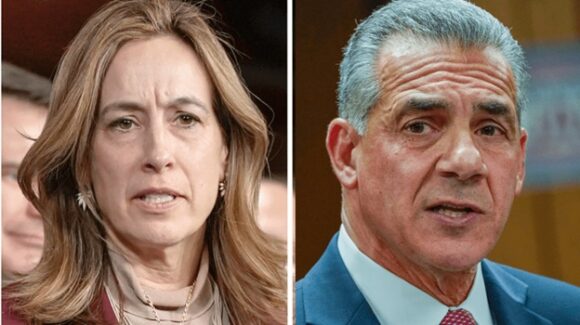Dear Commons Community,
Both Republican and Democratic proposals that would have funded the government past Tuesday failed in the Senate during the eleventh hour, effectively shutting down the government at 12:01 a.m. today.
The federal government ran out of money after a Democratic-backed spending bill that would have extended health care subsidies under the Affordable Care Act and reversed cuts to Medicaid failed, as well as the GOP-backed stopgap funding measure that would have funded the government for seven weeks also failed. As reported by ABC News.
Following the two failed votes on Tuesday, White House Office of Management and Budget Director Russell Vought told federal agencies they “should now execute their plans for an orderly shutdown.”
Senate Minority Leader Chuck Schumer urged Republicans to come to the negotiating table after the upper chamber failed to pass a measure to avert a government shutdown.
“We want to sit down and negotiate, but the Republicans can’t do it in their partisan way, where they just say it’s our way or the highway,” Schumer said at a news conference following Senate votes Tuesday night.
The Senate is expected to vote again on Wednesday, likely on the same two measures that failed Tuesday.
President Donald Trump and a bipartisan group of congressional leaders met at the White House on Monday afternoon to attempt to avoid the looming shutdown.
“I think we’re headed to a shutdown because the Democrats won’t do the right thing,” Vice President JD Vance said following that meeting.
Congressional Democrats are refusing to give Republicans the votes they need to pass a short-term funding agreement, demanding overhauls to Medicaid cuts and extensions to health care tax credits that Republicans don’t want to touch.
There have been — since the 1977 fiscal year — 20 funding gaps, some for as short as a day, marking Wednesday’s shutdown the 21st.
The last shutdown began in December 2018, during Trump’s first term, and was the longest shutdown in history — 35 days. During that shutdown, some federal workers began showing up at food banks and many essential workers began to call in sick. Union officials said many of them couldn’t afford the childcare or the gas needed to get to work.
By the time the government reopened in January 2019, about $3 billion in U.S. economic activity evaporated, never to be recovered, according to the Congressional Budget Office.
Agencies have been slow over the last few days to release contingency plans, but some have warned of potential effects.
Millions would be without pay
During the shutdown, as many as 4 million federal employees, including some service members, could go without a paycheck. Hundreds of thousands — including airport security officers, air traffic controllers and certain members of the military — will be deemed essential workers and told to come to work anyway. ICE agents also go without pay. National parks could close and the Smithsonian museums also typically close within a few days.
Roughly 2 million troops could be forced to work without pay, including hundreds of members of the National Guard that Trump has deployed to U.S. cities.
Federal contractors, including hourly workers such as janitors and security guards, are not required to work and are also not guaranteed back pay. Lawmakers on Capitol Hill would continue to get paid their $174,000 annual salaries.
Social Security, Medicare and Medicaid continue to be distributed, though there can be slowdowns.
The FDA can’t ensure that the meat, milk and eggs of livestock are safe for people to eat.
The Office of Management and Budget has not yet given a new estimate of how many federal workers are expected to go without pay or be furloughed if a shutdown were to happen this time around. However, OMB Director Russ Vought has threatened mass firings. Reductions in Force (RIFs) would be a drastic escalation from the fallout of past shutdowns. Democrats have called this an intimidation tactic.
It’s not just workers in and around Washington, D.C., who will feel the impacts. At least 85% of workers operate outside of the city (think federal prisons, courts, national parks, etc).
The Pentagon’s contingency plan
Some 2 million troops, including hundreds of National Guard members deployed to U.S. cities as part of Trump’s crackdown on crime, could be forced to work without pay next month due to the government shutting down without passing legislation to spare service members.
Most military personnel are on track to be paid Oct. 1, officials said Monday. But after that, troops would be at the mercy of negotiations on Capitol Hill, which remains at a stalemate.
If Congress can’t reach a deal early in the month to spare the troops as it’s done in the past, Defense Department personnel would be forced to go without pay for what appears to be the first time in decades. In 2018, Coast Guard personnel went without pay as employees of the Department of Homeland Security.
According to a contingency plan posted by the Pentagon over the weekend, all active-duty troops would be required to keep working. The plan says contracts can move forward too, but under increased scrutiny, with priority given to efforts to secure the U.S. southern border and build Trump’s U.S. missile shield, known as “Golden Dome.”
Middle East operations, depot maintenance, shipbuilding and critical munitions are also identified as priorities.
“The department will continue to defend the nation and conduct ongoing military operations,” the plan states.
“Military personnel on active duty, including reserve component personnel on Federal active duty, will continue to report for duty and carry out assigned duties,” the document later adds.
All federal employees are guaranteed back pay under the law once government spending resumes. During past shutdowns, some federal personnel struggled to continue reporting to work without the steady cash flow that can be used to pay for gas and child care.
About 25% of military families experience food insecurity, which is really a symptom of their broader financial stress, and about 25% of military families also report having less than $500 in savings, according to the National Military Family Association.
National Guard troops may work without pay
National Guard troops deployed to D.C., Oregon and Tennessee would potentially have to work without pay, even if they were under command of their governors. Under the laws mobilizing them, known as Title 10 and Title 32, the missions are federally funded.
The task force overseeing National Guard troops in Washington, D.C., said last week that it was aware of the “potential lapse” in funding and referred questions to the Pentagon, which hasn’t announced yet whether the Guard deployments would be deemed an “excepted activity,” meaning that it’s critical enough to the nation’s security.
According to the task force, Guard personnel deployed to the nation’s capital have cleared trash, spread mulch, painted fences, pruned trees and packaged food.
“National Guard members supporting JTF-DC will continue to execute their current mission and our commitment to the welfare and safety of DC residents is resolute,” the D.C. Guard task force wrote in a statement last week.
There was speculation that the military leaders who traveled from around the world to hear Trump and Secretary of Defense Pete Hegseth speak on Tuesday could get “stuck” away from their assigned work locations if the government shuts down overnight. The commanding officers were summoned to hear Trump and Hegseth talk about the importance of embracing a “warrior ethos.”
According to government guidance, personnel must return home as soon as possible if a shutdown occurs while on work travel. The travel costs are reimbursable, although it’s possible they might have to wait to be reimbursed until after the shutdown is over.
How travel and the TSA may be affected
Transportation Security Administration workers at airport checkpoints around the country would be expected to continue to work without pay during the shutdown. According to Department of Homeland Security documents, 58,488 employees out of the total TSA workforce of 61,475 would be retained during a shutdown.
Commercial flights would continue to operate and airline employees would not be impacted.
Over 13,000 air traffic controllers will continue to work without pay during the shutdown, according to the DOT‘s shutdown plan. The only controllers who will be furloughed will be those who are not certified and are in on-the-job training.
During the 2018-2019 shutdown, which lasted for 35 days, TSA officers called out of work at an increased rate due to financial hardship, a TSA spokesperson told ABC News at the time. These staffing shortages caused some TSA lines to close, which led to increased wait times for passengers to get through security.
ABC News reported at the time that air traffic controllers called out sick at the centers in New York, D.C. and Jacksonville, leading to a staffing-related groundstop at LaGuardia Airport and flight delays at New York and Florida airports. Hours after flights were halted, the shutdown ended.
How Health and Human Services may be affected
At the Department of Health and Human Services, about 59% of employees would be kept on during the shutdown. The rest would be furloughed.
Of the 47,257 who are being kept on during the shutdown, around 35,000 would continue to be paid, while around 12,000 would work without pay. About 32,460 HHS employees will be furloughed, meaning they won’t work and won’t be paid.
The percentage of staff that would be furloughed would vary by agency. The Centers for Disease Control and Prevention would be expected to keep only 36% of employees on, including 15% who would be asked to work without pay. At the Food and Drug Administration, some 86% of employees would continue working, including about 19% who would be asked to work without pay.
Notably, the FDA’s Animal Drugs and Foods Program “would end pre-market safety reviews of novel animal food ingredients for livestock, thus be unable to ensure that the meat, milk, and eggs of livestock are safe for people to eat; activities would be limited to those that address imminent threats to the safety of human life.”
And at the National Institutes of Health, about 24% of employees would stay on, with nearly all of whom will be asked to work without pay.
Litigation may be ‘postponed’ at Justice Department
The Justice Department said it has “a high percentage of activities and employees” who would be required to continue operations during the government shutdown.
But civil litigation activities may be curtailed or “postponed” in the event they don’t involve the safety of human life or the protection of property, according to a contingency plan released on Monday by the DOJ.
Other operations that could be impacted during the government shutdown involve training of employees not covered under previous appropriations, as well as work done under the Office of the Pardon Attorney and other similar services not involving national security, law enforcement or criminal justice system responsibilities.
A previous Senate report stemming out of the 2018-2019 shutdown found the DOJ had to cancel as many as 60,000 immigration hearings as a result of the lapse in funding.
In the DOJ’s updated contingency plan, however, the department noted that nearly all staff of DOJ’s Executive Office for Immigration Review involved in processing immigration cases would be required to continue work under Trump’s national emergency issued with respect to illegal immigration.
Labor Department’s ‘active’ data collection would be stalled
Of the Department of Labor’s 12,916 employees, about 3,141 would be retained during the shutdown.
The department, which is responsible for publishing figures related to employment in the United States, would not be expected to publish the jobs report scheduled for Friday.
All “active” data collection would also stop.
Social Security, Medicare and Medicaid would continue
The biggest portion of federal spending is considered “mandatory” and will actually remain untouched, including payments by Social Security, Medicare and Medicaid.
While government officials say these payments generally won’t be affected, some related services could become slow, such as receiving replacement cards and benefit verification services.
The shutdown also threatens the nearly 7 million low-income women and their young children who rely on programs like WIC — the federal supplemental nutrition program for women, infants and children — which helps with groceries and health services.
If the shutdown goes on for any longer than roughly a week, WIC may begin running out of funding, Ali Hard, policy director for the National WIC Association, told ABC News’ Selina Wang.
The mail would continue
The U.S. Postal Service, which uses its own revenue stream, would not be affected by a lapse in government funding.
DC operations would be handled by city officials
Although the District of Columbia government will not shut down even though the federal government did, city officials are prepared to step in.
They may be called on to handle everything from trash pickup at the National Mall and other key sites to issuing marriage licenses if the federal judiciary closes. City leaders said it could be some time before that happens, but they remain prepared. Community leaders, meanwhile, are bracing for a busy October.
ABC News spoke to two nonprofit leaders who operate community-owned food pantries in the D.C. area, who have seen a rise in need over the past year.
Brian Mulholland of the John S. Mulholland Family Foundation said his pantry saw a rise in need during the Department of Government Efficiency cuts. Over the past month, one of his food pantries was contacted by 40 families in need. Many of them were hesitant to leave their homes during the federal surge of law enforcement and National Guard in the District.
Mulholland said he saw a rise in requests for food deliveries because families were unable to work, unable to buy groceries and fearful of arrest by ICE.
In Prince George’s County, Mel Johnson, of The StoreHouse, said she has also seen a steady increase in demand and says she needs more support.
Johnson’s organization, which is funded by her family, is believed to be the first Black-run food bank in America. It operates two locations, one in Prince George’s County, Maryland, and another in Columbia, South Carolina, near Fort Jackson. Both sites have seen an increased need. In Maryland, Johnson supports more than 4,000 families, and in South Carolina, about 900 families. Both locations rely heavily on support from military and government families.
The Supreme Court would be largely unaffected
Federal courts may be forced to quickly curtail operations — potentially delaying trials and other hearings — if congressional funding is not extended, a spokesperson for the Administrative Office of U.S. Courts told ABC News.
While in previous government shutdowns the courts found ways to utilize court fees and other financial tools to sustain full functionality and schedules — at least for several weeks — years of tighter budgets and rising costs have created a much more difficult situation today.
The U.S. Supreme Court — which was established by the Constitution, not Congress — would be largely unaffected.
Justices and federal judges would continue to be paid during the shutdown because federal law prohibits cuts to their pay once appointed for life. Many of the 33,000 other employees of the federal judiciary could face furloughs without pay.
The last time the judiciary experienced staff furloughs during a shutdown was in 1995, when appropriations lapsed for three weeks until Congress reached a deal to end the standoff.
Workers carrying out firings could work during shutdown
Federal government employees who oversee firings would be allowed to continue working during the government shutdown, the Office of Personnel Management said in a memo on Monday.
The guidance appears to pave the way for the Trump administration to follow through on plans to lay off federal workers if the government shuts down.
In another change in policy from past shutdowns, furloughed federal employees will be able to use government-issued computers — to check for emails announcing layoffs, OPM said in the memo.
In the past, furloughed workers have been prohibited from using official laptops during shutdowns for any reason.
This shutdown is Trump’s baby!
Tony












